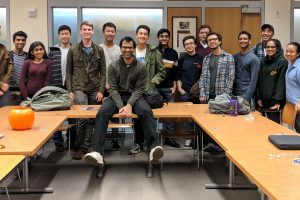
Data science is growing at a rapid rate. Companies are now looking for professionals who can examine large amounts of data to execute business decisions quickly.
“It is a very useful and applicable set of skills that one can put under their belt in preparation for future careers,” said Anand Malpani PhD ‘17, assistant research scientist at the Malone Center for Engineering in Healthcare at Johns Hopkins University.
This fall, Malpani is teaching a course, Data Science for Healthcare Applications, through the Hopkins Engineering Applications & Research Tutorials (HEART) program. “The HEART program allows me to cater to the entire undergraduate population and teach data science without expecting any pre-requisites to have been completed. It adds a challenge to how I structure the course and teach it,” said Malpani. “It helps me become a better science communicator by explaining concepts to an audience who isn’t familiar with my research. And, that is one of the goals of the HEART program – to give future academicians an exposure to teaching.”
The course will introduce undergraduates to the most sought-after skills in today’s job market: data science and machine-learning. Coursework will use visual illustrations to explain everything from founding principles of statistics and probability to fundamental concepts behind common day machine- learning applications like Facebook’s photo tag suggestions and Google’s auto search completion. In addition, the course will present insights on how data science can revolutionize the field of surgery, also known as surgical data science.
“An introduction to data science, the course will entice students who are interested in the field to dive deeper in the subject and take full credit courses while studying at Hopkins,” said Malpani. “If those two words ‘data’ and ‘science’ are not enough, add ‘healthcare’ to the mix, you are now talking about the application domain that JHU is well-known for globally.”
The course was initially offered in 2017 and co-instructed by Princy Parsana, a fifth-year PhD student in computer science.
“With our 2017 offering, we saw students change their majors to computer science just to learn more. We saw students who started working in research groups conducting data science research. Data science has such a broad spectrum of applications that students from multiple majors may find it useful down the road,” said Malpani.
Malpani’s research focus is the development of technology platforms in the realm of surgical-skill training and assessment powered by crowdsourcing and machine-learning. Learn more about the course offering at: https://engineering.jhu.edu/heart/.